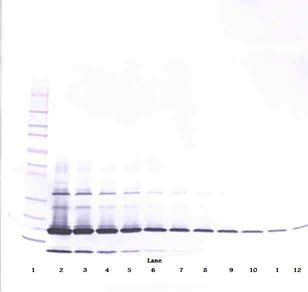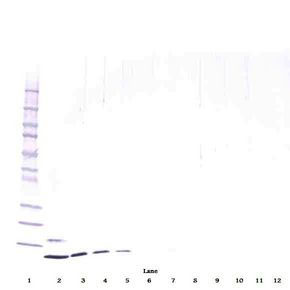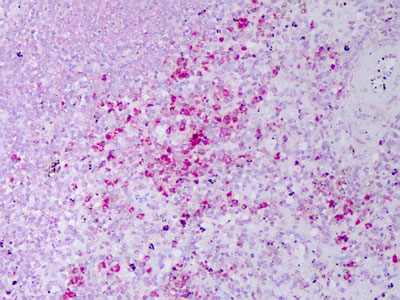RETN / Resistin Antibody
Mouse Monoclonal Antibody
- SPECIFICATION
- CITATIONS
- PROTOCOLS
- BACKGROUND

Application
| WB, IHC-P, E |
|---|---|
| Primary Accession | Q9HD89 |
| Reactivity | Human |
| Host | Mouse |
| Clonality | Monoclonal |
| Calculated MW | 11kDa |
| Dilution | IHC-P (10 µg/ml), WB (0.2-0.4 µg/ml), |
| Gene ID | 56729 |
|---|---|
| Other Names | Resistin, Adipose tissue-specific secretory factor, ADSF, C/EBP-epsilon-regulated myeloid-specific secreted cysteine-rich protein, Cysteine-rich secreted protein A12-alpha-like 2, Cysteine-rich secreted protein FIZZ3, RETN, FIZZ3, HXCP1, RSTN |
| Target/Specificity | Human Resistin |
| Reconstitution & Storage | Store Lyophilized at room temperature up to 1 month; Reconstituted for up to two weeks at 2-8°C. Aliquot and freeze at -20°C for long term storage. Avoid freeze/thaw cycles. |
| Precautions | RETN / Resistin Antibody is for research use only and not for use in diagnostic or therapeutic procedures. |
| Name | RETN |
|---|---|
| Synonyms | FIZZ3, HXCP1, RSTN |
| Function | Hormone that seems to suppress insulin ability to stimulate glucose uptake into adipose cells (By similarity). Potentially links obesity to diabetes (By similarity). Promotes chemotaxis in myeloid cells (PubMed:15064728). |
| Cellular Location | Secreted {ECO:0000250|UniProtKB:Q99P87}. |
| Tissue Location | Expressed in white adipose tissue (at protein level) (PubMed:11201732). Widely expressed, with particularly strong expression in lung, bone marrow, breast and peripheral blood (PubMed:15248836). Expressed strongly in bone marrow and at lower levels in lung, but not detected in other tissues (PubMed:15064728) Isoform 2 is detected in adipose tissue, bone marrow, brain, lung, peripheral blood, placenta and thymus (PubMed:15248836) |

Thousands of laboratories across the world have published research that depended on the performance of antibodies from Abcepta to advance their research. Check out links to articles that cite our products in major peer-reviewed journals, organized by research category.
info@abcepta.com, and receive a free "I Love Antibodies" mug.
Provided below are standard protocols that you may find useful for product applications.
Background
Hormone that seems to suppress insulin ability to stimulate glucose uptake into adipose cells. Potentially links obesity to diabetes.
References
Holcomb I.N.,et al.EMBO J. 19:4046-4055(2000).
Steppan C.M.,et al.Nature 409:307-312(2001).
Kubota T.,et al.Blood 96:3953-3957(2000).
Nohira T.,et al.Eur. J. Endocrinol. 151:151-154(2004).
Rajala M.W.,et al.Submitted (JUL-2000) to the EMBL/GenBank/DDBJ databases.
If you have used an Abcepta product and would like to share how it has performed, please click on the "Submit Review" button and provide the requested information. Our staff will examine and post your review and contact you if needed.
If you have any additional inquiries please email technical services at tech@abcepta.com.













 Foundational characteristics of cancer include proliferation, angiogenesis, migration, evasion of apoptosis, and cellular immortality. Find key markers for these cellular processes and antibodies to detect them.
Foundational characteristics of cancer include proliferation, angiogenesis, migration, evasion of apoptosis, and cellular immortality. Find key markers for these cellular processes and antibodies to detect them. The SUMOplot™ Analysis Program predicts and scores sumoylation sites in your protein. SUMOylation is a post-translational modification involved in various cellular processes, such as nuclear-cytosolic transport, transcriptional regulation, apoptosis, protein stability, response to stress, and progression through the cell cycle.
The SUMOplot™ Analysis Program predicts and scores sumoylation sites in your protein. SUMOylation is a post-translational modification involved in various cellular processes, such as nuclear-cytosolic transport, transcriptional regulation, apoptosis, protein stability, response to stress, and progression through the cell cycle. The Autophagy Receptor Motif Plotter predicts and scores autophagy receptor binding sites in your protein. Identifying proteins connected to this pathway is critical to understanding the role of autophagy in physiological as well as pathological processes such as development, differentiation, neurodegenerative diseases, stress, infection, and cancer.
The Autophagy Receptor Motif Plotter predicts and scores autophagy receptor binding sites in your protein. Identifying proteins connected to this pathway is critical to understanding the role of autophagy in physiological as well as pathological processes such as development, differentiation, neurodegenerative diseases, stress, infection, and cancer.




